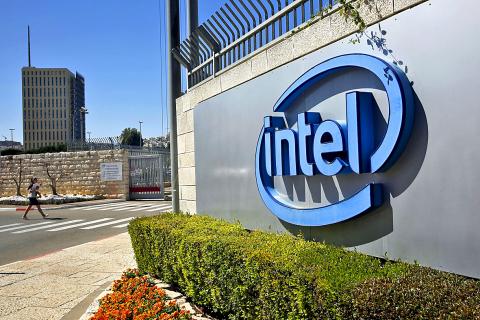Asustek Computer Inc (華碩) and Acer Inc (宏碁) yesterday said their relationships with Intel Corp would remain unaffected amid speculation about the computer chip giant’s planned exit from the mobile chip market.
Intel is canceling its Atom chips — provisionally titled Broxton and SoFIA — for smartphones and tablets, so that the company can focus on cloud and smart connected computing devices, it said.
“We are committed to long-term leadership and improved profitability of our mobile business and the decision to cancel Broxton for phones and tablets and SoFIA 3Gx/LTE/LTE2 enables us to move resources to products that deliver higher returns and advance our strategy,” Intel said in a statement, quoted by the AnandTech Web site on Friday last week.

Photo: Reuters
Part of Asustek’s ZenFone smartphone series uses Intel mobile chips and Acer uses Intel mobile chips for its tablets, but both Asustek and Acer declined to comment on Intel’s decision to scale back its mobile system-on-chip (SoC) business.
An Asustek official who declined to be named said Intel’s move is expected to only have a limited impact on Asustek’s smartphone segment, as the company has been reducing its use of Intel chips since the second half of last year.
Asustek’s smartphone business saw rapid growth in 2014 and last year, partly due to Intel’s subsidized sales of SoCs to Asustek ,which enabled the Taiwanese company to offer low retail prices for its smartphones while maintaining a healthy level of profitability, people familiar with the matter said.
Since Intel withdrew its subsidy plan in the first half of last year, Asustek has gradually lowered its use of Intel chips in its smartphones and shifted focus to Qualcomm Inc and MediaTek Inc’s (聯發科) SoCs, the people said.
By the end of last year, Qualcomm chips were used in between 50 percent and 60 percent of Asustek’s smartphone models, while Intel chips were used in less than 20 percent, the Asustek official said.
The official said Asustek’s upcoming flagship smartphone ZenFone 3 series would mainly use Qualcomm chips, and the percentage of Intel chips used in the firm’s handsets would continue to fall.
The relationship between Asustek and Intel would not be affected by the firm’s reduced use of Intel chips in its smartphones, the official said.
“Asustek and Intel are long-time partners. We look forward to cooperating in the Internet-of-Things [IoT] field or even in smart cars in the near future,” the official said.
Acer said the company and Intel have been collaborating on a wide range of products for a long time, and its existing projects with Intel would remain unchanged.
However, Acer said it would watch closely to see whether Intel’s planned decision would affect the Taiwanese firm’s product strategy, adding that products would be adjusted if necessary.

KEEPING UP: The acquisition of a cleanroom in Taiwan would enable Micron to increase production in a market where demand continues to outpace supply, a Micron official said Micron Technology Inc has signed a letter of intent to buy a fabrication site in Taiwan from Powerchip Semiconductor Manufacturing Corp (力積電) for US$1.8 billion to expand its production of memory chips. Micron would take control of the P5 site in Miaoli County’s Tongluo Township (銅鑼) and plans to ramp up DRAM production in phases after the transaction closes in the second quarter, the company said in a statement on Saturday. The acquisition includes an existing 12 inch fab cleanroom of 27,871m2 and would further position Micron to address growing global demand for memory solutions, the company said. Micron expects the transaction to

Vincent Wei led fellow Singaporean farmers around an empty Malaysian plot, laying out plans for a greenhouse and rows of leafy vegetables. What he pitched was not just space for crops, but a lifeline for growers struggling to make ends meet in a city-state with high prices and little vacant land. The future agriculture hub is part of a joint special economic zone launched last year by the two neighbors, expected to cost US$123 million and produce 10,000 tonnes of fresh produce annually. It is attracting Singaporean farmers with promises of cheaper land, labor and energy just over the border.

US actor Matthew McConaughey has filed recordings of his image and voice with US patent authorities to protect them from unauthorized usage by artificial intelligence (AI) platforms, a representative said earlier this week. Several video clips and audio recordings were registered by the commercial arm of the Just Keep Livin’ Foundation, a non-profit created by the Oscar-winning actor and his wife, Camila, according to the US Patent and Trademark Office database. Many artists are increasingly concerned about the uncontrolled use of their image via generative AI since the rollout of ChatGPT and other AI-powered tools. Several US states have adopted

A proposed billionaires’ tax in California has ignited a political uproar in Silicon Valley, with tech titans threatening to leave the state while California Governor Gavin Newsom of the Democratic Party maneuvers to defeat a levy that he fears would lead to an exodus of wealth. A technology mecca, California has more billionaires than any other US state — a few hundred, by some estimates. About half its personal income tax revenue, a financial backbone in the nearly US$350 billion budget, comes from the top 1 percent of earners. A large healthcare union is attempting to place a proposal before